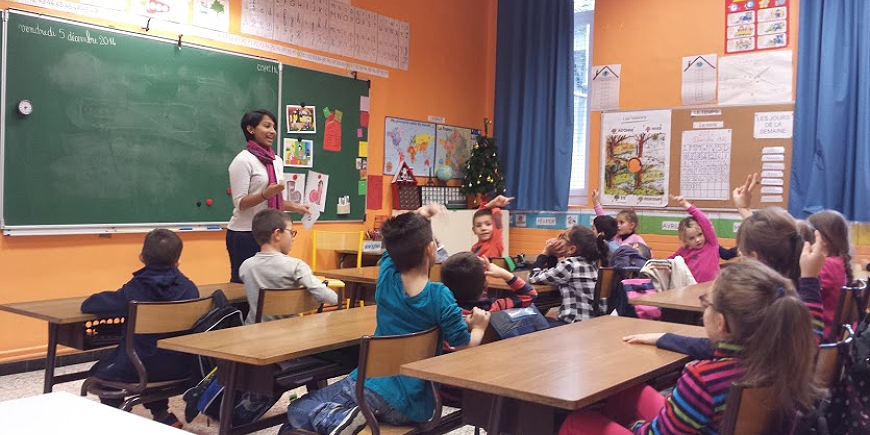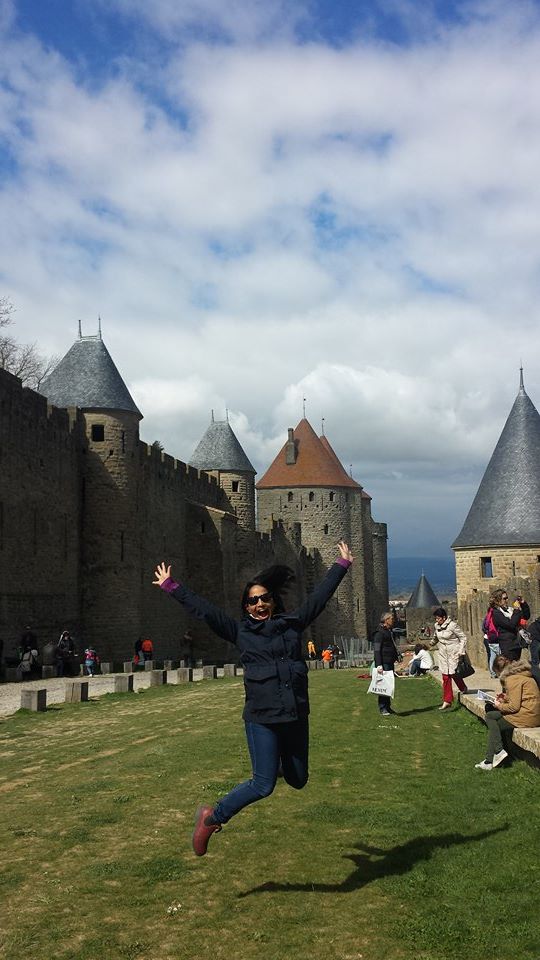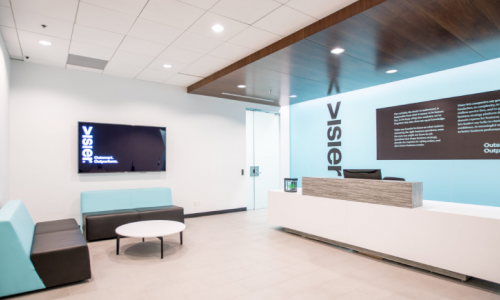
If I had said the idea of moving thousands of kilometers away to a foreign country, where I knew no one, to teach English in an elementary school, was not daunting or overwhelming to me when this opportunity first presented itself, I would have been lying. However, this was an opportunity unlike anything else, and the excitement to travel abroad and work internationally outweighed the fear and uncertainty I felt. My role as an English language assistant would be to provide students with the enthusiasm, motivation and confidence to speak English, and to cultivate their cultural learning by introducing them to Canadian traditions, holidays, and significant historical events. Close to seven months later, I am so happy I took a chance and clicked the “submit” button on my application to become a language assistant in the south of France.
While I promised myself pre-departure to step out of my comfort zone and embrace my independence, as cliché as it sounds, the expression “old habits die hard” exists for a reason.
If there was a word I would use to describe my life prior to starting my international co-op, it would have been “comfortable”. I was comfortable at school, comfortable at home, and comfortable in my surroundings. However with comfort came boredom, routine and very limited opportunity to grow. I knew as I embarked on this co-op that I not only wanted to expand and cultivate my professional portfolio, but also test and push past my comfort level, and open myself up to the unknown.
In this post, I thought I would share some advice on how I made the most out of my co-op abroad and pushed myself past my comfort level, and in turn created invaluable memories and lasting friendships. These are the three biggest lessons I learned abroad:
1. Break Away from Groups and Integrate Yourself with Native Speakers
As part of an organization for Anglophones teaching in France, I met numerous English speakers from Canada, the US, England, India and even Germany. As many of them were the first people I met, it was easy to cling to other young English speakers. However, what is the point of travelling over eight thousand kilometers to a foreign country, just to stick to what you already know?
Actively choosing to put myself out there to meet people was difficult. Like in any city, not everyone is very open to new people, and forging connections can be hard. I was very fortunate to have been introduced to locals by my landlords, which led me to join gym classes, and eventually meet other people close in age. Additionally, I made a conscious effort to eat lunch everyday with my colleagues in the staff kitchen. It would have been much easier and more comfortable for me to stay in the separate staff room alone, but not only did eating lunch with the other staff expose me to everyday spoken French and the nuances of the language, it also allowed me to get to know the other teachers on a much more personal level. As a result, many of them offered travel advice, leant me books in French, and recommended local events.
It is natural to want to cling to what you know when you’re suddenly faced with so much change. However the point of an international work experience is to learn and expand your cultural understanding. A few ideas to meet locals: join a sports team, volunteer with an organization in your area, or sign up for a group exercise class, like I did.
2. Look for Adventure and Opportunity, and Maximize on Your Free Time
As a student, like many others, I am by no standard wealthy so travelling for cheap required a little more organization and planning. That being said, it is absolutely worth the effort as you open yourself up to different cultures, history, perspectives and people. I took advantage of my weekends by travelling and exploring areas within and outside the region I was living in. Some of my favourite trips were to places just an hour away, and on average it cost less than ten dollars to get there, so you do not need to break the bank to explore new cities. Many places also have cheaper means of transportation that may not be advertised, so it requires doing a little research, whether online or by asking locals. Moreover, these reduced fares usually have limited tickets, thus booking a couple weeks in advance is key. For example, I discovered regional trains for one euro (approximately a dollar and thirty-three cents) if booked two weeks prior that typically cost close to twenty-five euros if booked the day before. I also made the most of all the discounts for people under twenty-six available in Europe, from train and museum passes, to event and movie tickets.
Everyone is allowed to have lazy Sundays, but do not make it a habit to spend all your free days as a hermit in your room watching Netflix. As someone who generally spent her weekends at home in Vancouver, this was something I recognized early on that I needed to change, especially once in France, if I wanted to benefit from my time abroad. Whether in a group, a pair, or solo, travelling and discovering local and distant regions is a fantastic way to broaden your horizons and open you up to unique experiences.

My third piece of advice is something I am still working on. Even with ten plus years of French schooling, nothing could have prepared me for the sudden shift in language and having to adapt so quickly. I would confidently say that I am fluent in French when it comes to comprehension, however when it comes to speaking, I’m a little less sure of myself. I was always worried about grammatical mistakes, and even if I knew the words, I would say them with such little confidence that it would often come out sounding like a question. Despite being told repeatedly that I spoke French well, it was hard to feel completely confident when speaking a foreign language to native speakers. I remember I once apologized very embarrassed to a co-worker after I used the wrong verb tense. His reaction was almost that of confusion as he responded saying I did not need to apologize, that even he makes mistakes like that, and there was no reason to feel embarrassed as my French is much better than his English so he has no grounds to judge.
What I realized was that I was way harder and judgmental towards myself than anyone else would ever be when it came to speaking another language. At some point I just accepted the fact that my French was not going to be perfect, mistakes were bound to happen, and there’s nothing to be embarrassed or insecure about because it’s just a part of learning. As soon as I did that, my experiences changed drastically as I wasn’t afraid to make conversation. I would speak with anyone from my co-workers to the lady I often saw at the bakery. This newfound confidence allowed me to form great friendships. Though my speaking confidence isn’t at its peak, it has vastly improved.
The truth is, there is no shortcut or magic method to learning a language. The only thing you can do is practice, and that means speaking. It can be really intimidating to live in a country where the native language is not your first, and while it can be incredibly frustrating to not understand what is being said, or to use the wrong words, you just need to let go and embrace the fact that this is all apart of learning a new language. There are free apps and online language exchanges that are great for getting extra practice, such as Duolingo and sharedtalk.com. For writing, linguee.com and reverso.net are my best recommendations. Stay away from Word Reference!
Putting yourself out there and inching past your comfort zone is never an easy task, but it can prove to be the best decision both personally and professionally once done. It can open up your world to new perspectives, helps you gain knowledge and provides memories that last long after your work term ends.















